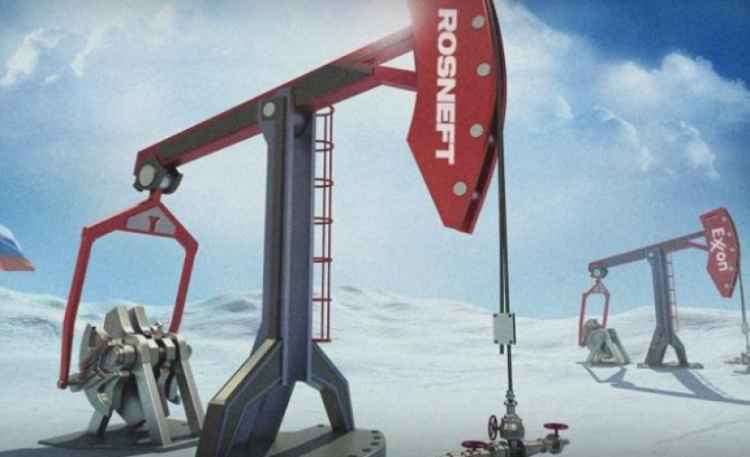© 2020 All rights reserved to Maaal Newspaper
Publisher: Maaal International Media Company
License: 465734
European embargo on Russian oil… Possible scenarios!
Analysts have warned that the upcoming sanctions on Russian oil will be “really devastating” to energy markets if European countries fail to implement a price cap. As 27 countries in the European Union agreed last June to ban the purchase of Russian crude oil, starting from the fifth of December. In practice, the European Union – along with the United States, Japan, Canada and the United Kingdom – seeks to significantly reduce Russia’s oil revenues in an attempt to drain the source of financing for the Kremlin’s war after the invasion of Ukraine.
However, fears that a complete embargo might lead to higher crude oil prices prompted the Group of Seven major industrialized nations to consider capping the amount they would pay for Russian oil. According to Henning Gloystein, director of energy, climate and resources at the political risk consultancy Eurasia Group, a total ban on Russian imports could be “really devastating” to markets.
American pressure:
Glustein indicated in his interview with “CNBC” that the possibility of a rise in oil prices is “the reason for the pressure from the United States” to agree to a ceiling, especially since setting the price will lead to the G7 countries buying Russian oil at a price Less, in an effort to reduce Russia’s oil income without raising crude oil prices around the world. However, the European Union countries have been in a dispute for several days over the appropriate level of the price cap
Dispute about the price:
The proposal discussed earlier this week set $62 a barrel, but Poland, Estonia and Lithuania refused to agree to it, arguing that it was too high to affect Russia’s revenues. These countries were among the countries most determined to press for action against the Kremlin over its war in Ukraine.
For his part, Dutch Minister of Climate and Energy Policy Rob Gitten stressed in his interview with the agency that setting a ceiling for Russian oil prices “is the most important next step.”
Stressing the need for a mechanism to determine the price of oil, to impose effective sanctions that really harm the Russian regime, expressing his hope to reach an agreement as soon as possible.
Moscow position:
Last weekend, Russian oil was trading at around $66 a barrel. Kremlin officials have repeatedly said that setting a price cap is anti-competitive and they will not sell their oil to countries that have applied the cap. While Moscow hopes that other major buyers – such as India and China – will not agree to set a ceiling, and thus will continue to buy Russian oil.
The G7 nations agreed to curb Russian oil in September and have been working on the details since then
At the same time, European Energy Commissioner Cadre Simpson told CNBC that she hopes China and India will support the price cap as well. At a time when the two countries have stepped up their purchases of Russian oil in the wake of Moscow’s invasion of Ukraine, taking advantage of lower prices. Their participation is seen as essential if the restrictions on Russian oil are to succeed.
Policy agenda:
Jakob Kierkegaard, senior fellow at the Peterson Institute for International Economics, said that China and India play a crucial role in their purchase of the bulk of Russian oil. “However, they will not stick to the ceiling, for political reasons, because this policy is sponsored by the United States also. There are commercial reasons, because they already get a lot of cheap oil from Russia, so why risk losing that? It was naive to think that they would join voluntarily because Ukraine is not important to them.
This was confirmed by the Indian Minister of Petroleum, when he said in September that he had a “moral duty” towards consumers in his country. “We will buy oil from Russia and we will buy from anywhere,” he added. As such, there are growing doubts about the real impact of the restrictions on Russia. “Energy sanctions against Russia have come too late and too timid,” Guntram Wolf, director of the German Council on Foreign Relations, said via email.
Sanctions effect:
According to Foreign Policy, there have been ongoing discussions about the effectiveness of sanctions on Russia. Politicians on the far right and far left see the sanctions as ineffective and only hurt Europeans. French far-right leader Marine Le Pen called the sanctions “absolutely useless, except for making Europeans suffer.”
In Germany, the views of not only the right-wing Alternative for Germany agreed with her but also by prominent left-wing politicians, such as Sahra Wagenknecht, who recently said: “Sanctions don’t hurt Russia — they only hurt us.” For these Kremlin-friendly voices, the sanctions have done virtually no harm to the Russian economy, which in their view is thriving amid soaring energy prices. However, others who do not necessarily share Moscow’s views argue that the sanctions were a failure because they did not stop Russian President Vladimir Putin from stepping up his attacks on Ukraine.
For her part, Agathe Demaris, forecasting director at The Economist Research Unit, believes that the aim of the sanctions is not regime change in Moscow, as the sanctions imposed on Cuba, North Korea and Syria show that this never works, and there is also no reason to believe that Putin’s hypothetical successor will change track in Ukraine. Also, it is not aimed at the collapse of the economy in the manner of Venezuela. For the Russian economy, either that would be impossible when the goal is the eleventh economy in the world. Besides, Russia’s collapse is likely to lead the global economy into recession through the sudden cessation of Russia’s exports of many commodities, including grains, fertilizers, energy, and minerals.
Contradictory policy:
The British newspaper, The Economist, said in an analysis that since Russia invaded Ukraine last February, US energy policy has pursued two seemingly contradictory goals. The first is to keep global oil supplies high enough so that prices remain acceptable and public support for sanctions remains strong.
The second is to stifle Vladimir Putin’s war machine by stopping the flow of dollars that Russia earns from oil production. Together they form a circle that is difficult to square, because with supply closely following demand amid scarce new production, mechanically taking any oil out of the market causes prices to rise. However, the West has attempted to defy the law of physics by crafting an ever-growing array of measures to intervene in the oil markets
Regarding US oil policy, it has been fragmented and involved uncomfortable concessions, according to the analysis. On November 26, America, which had waived its sanctions against the regime in Venezuela, granted permission to Chevron, a major US oil company, to increase its production there. America also released huge quantities of its strategic reserves of crude oil. It also called on the oil states in the Gulf, including the Kingdom of Saudi Arabia, to pump more oil.
Related






